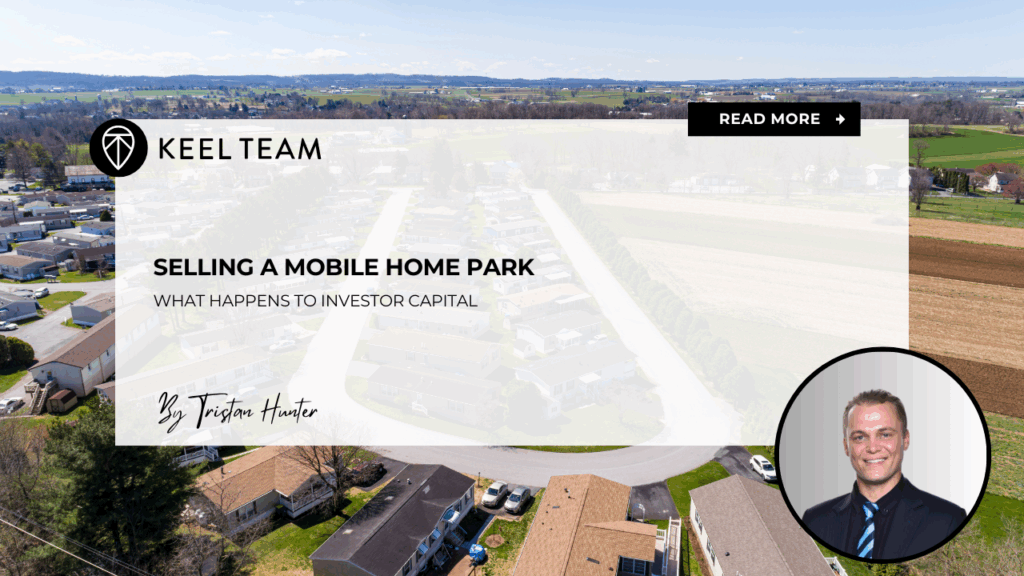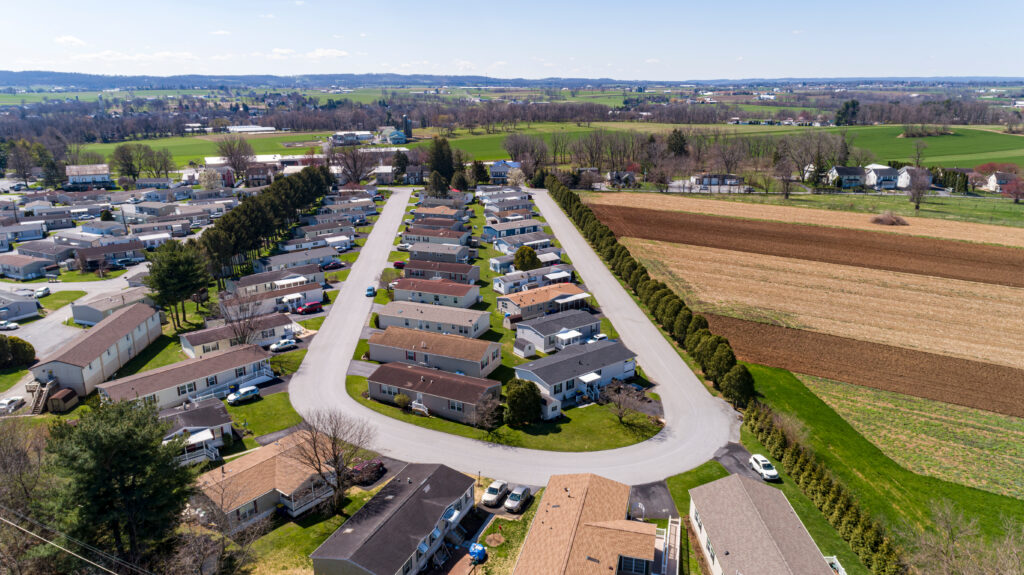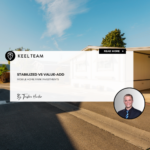Selling a Mobile Home Park: What Happens to Investor Capital
-
 Tristan Hunter - Investor Relations
Tristan Hunter - Investor Relations

Investing in a mobile home park can be an exciting opportunity for passive investors seeking cash flow, equity growth, and long-term stability. But one of the biggest questions we hear from investors is: “What happens to my money when the mobile home park is sold?” In this article, we’ll walk through what typically happens at the disposition stage — from the sale process itself, to how investor capital is returned, and how profit distributions are handled. As always, keep in mind that every syndication is different. The following is for educational purposes only and not a guarantee of any particular outcome.
Understanding the Disposition Phase
The disposition phase is simply the final step in a mobile home park investment’s lifecycle. After years of operating and improving the property — collecting lot rent, upgrading utilities, and optimizing expenses — the operator may choose to sell the mobile home park.
This decision is often driven by market conditions. For example, if cap rates have compressed and valuations are attractive, it may be a good time to sell and lock in gains. Sometimes disposition also aligns with a pre-planned business strategy, such as after a refinance or a set number of years in the hold period.
Download our FREE eBook on the Top 20 things to know BEFORE investing in mobile home parks!
Step 1: Preparing the Mobile Home Park for Sale
Before the sale, the operator usually prepares the property to achieve the highest possible valuation. This could include:
- Stabilizing occupancy: Ensuring vacant lots are filled or homes are installed to boost income.
- Finalizing CapEx projects: Completing roadwork, water line replacements, or community signage to present a turnkey asset.
- Optimizing operations: Making sure collections are strong, expenses are consistent, and financial records are clean for buyers.
For limited partners, this phase is important because a well-prepared property generally commands a better price, which can result in higher returns at closing.
Step 2: Negotiating the Sale and Closing
Once the property is marketed, the operator will negotiate offers with potential buyers. During this period:
- A Letter of Intent (LOI) is signed, outlining price and terms.
- The buyer performs due diligence, reviewing financial statements, rent rolls, utility bills, and conducting inspections.
- If everything checks out, the sale proceeds to closing.
As a passive investor, you usually do not participate directly in negotiations. However, you should receive communication from the syndicator or operator with regular updates, including the expected closing date.
Step 3: The Flow of Funds at Disposition
This is the part most investors want to understand clearly — what happens to your money when the mobile home park sale closes.
Returning Investor Capital
First, the net proceeds from the sale (after paying off any outstanding debt, closing costs, broker fees, and other expenses) are used to return the original investor capital.
For example, if you invested $100,000 as a limited partner, you would typically receive that $100,000 back before any profits are split.
Splitting Profits According to the Waterfall
After capital has been returned, the remaining profits are distributed according to the deal’s agreed-upon waterfall structure.
Most mobile home park syndications have a structure similar to this:
- Preferred Return Catch-Up: If there are any unpaid preferred returns from prior quarters, these are made current.
- Return of Capital: Your original investment is repaid.
- Profit Split: Remaining profits are shared between investors (limited partners) and the operator (general partner) based on a pre-agreed percentage, often 70/30 or 80/20.
Because every syndication can be structured differently, it is always wise to review your Private Placement Memorandum (PPM) and subscription agreement to understand exactly how your deal handles distributions.

Example of a Hypothetical Sale
Let’s look at a simplified example to make this concrete:
- Original Investor Capital: $2,000,000
- Net Sale Proceeds After Debt Payoff: $4,500,000
Here’s how the money might flow:
- Return of Capital: First $2,000,000 is returned to investors.
- Remaining Proceeds: $2,500,000 left over.
- Split Profits: At an 20/80 split, investors receive $500,000 (20%) and the operator receives $2,000,000 (80%).
As an investor, you would receive your original principal back plus your share of the $500,000 profit, pro-rata based on your ownership percentage.
Taxes and Considerations After the Sale
When you receive proceeds from a mobile home park sale, there are tax considerations to keep in mind.
Capital Gains
Generally, profits from the sale are treated as capital gains. If the mobile home park was held for more than a year, this is typically taxed at long-term capital gains rates, which may be lower than ordinary income rates.
Depreciation Recapture
If depreciation was taken during the hold period (which is common in real estate syndications), some portion may be subject to depreciation recapture tax at the time of sale.
1031 Exchange Options
In some cases, the syndicator may offer a 1031 exchange into another property. This allows you to defer capital gains taxes by rolling your proceeds into a new deal. Not every sponsor provides this option, so it’s worth asking in advance if tax deferral is important to you.
Communication and Investor Reporting
Good operators keep their investors informed throughout the disposition process. You might receive:
- Announcements of the intent to sell
- Regular updates during negotiations and due diligence
- Estimated timelines for closing and distributions
- Final closing statement showing how proceeds were calculated
This transparency helps investors understand exactly what they are receiving and how the amounts were determined.
Key Takeaways for Passive Investors
Selling a mobile home park can be one of the most exciting moments in a syndication because it often represents the largest cash distribution you’ll receive during the life of the investment.
Here are the main points to remember:
- Your original investment is typically returned first.
- Profits are split according to the agreed waterfall, often favoring investors.
- There may be tax implications, including capital gains and depreciation recapture.
- Communication from the operator should keep you informed every step of the way.
Because every deal is unique, it’s essential to review your PPM, operating agreement, and any updates from the sponsor to fully understand what to expect at disposition.
Final Thoughts
For passive investors, understanding what happens at disposition is crucial to setting realistic expectations. When the mobile home park is sold, your capital is usually returned first, followed by your share of the profits. The amount you receive will depend on the final sale price, debt payoff, and your percentage of ownership.
Mobile home park investing can be a powerful tool for generating both cash flow and equity growth, but as with any investment, there are variables outside of anyone’s control. By staying informed, reviewing deal documents carefully, and working with experienced operators, you can better position yourself for a positive outcome when disposition day arrives.
Are you looking for MORE information? Book a 1-on-1 consultation with Andrew Keel to discuss:
- A mobile home park deal review
- Due diligence questions
- How to raise capital from investors
- Mistakes to avoid, and more!
Disclaimer:
The information provided is for informational purposes only and is not investment advice or a guarantee of any kind. We do not guarantee profitability. Make investment decisions based on your research and consult registered financial and legal professionals. We are not registered financial or legal professionals and do not provide personalized investment recommendations.

Tristan Hunter - Investor Relations
View The Previous or Next Post
Subscribe Below 👇





